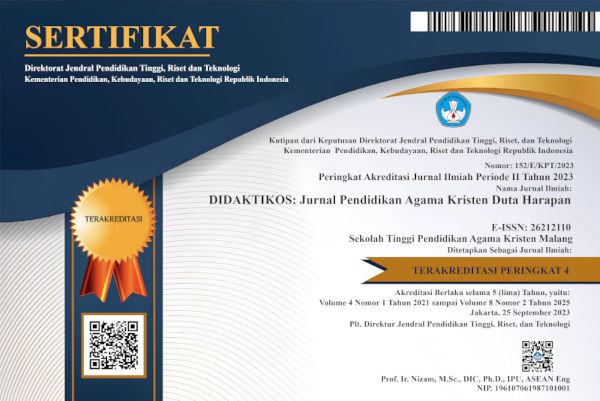Penggunaan Strategi Cooperative Learning Tipe Jigsaw Oleh Guru PAK Dalam Meningkatkan Hasil Belajar Siswa SD Kristen Elim Kelas III
DOI:
https://doi.org/10.32490/didaktik.v6i2.173Abstract
Abstract: In learning, strategy is a factor that can influence the success of learning in the classroom. One of them can be seen from the increase in learning outcomes experienced by students in the cognitive, affective, and psychomotor domains. Based on the results of observations at Elim Christian Elementary School, it was suspected that there were weaknesses in choosing learning methods so that they had an effect on the achievement of less than optimal Christian Religious Education learning outcomes. Conventional learning methods focusing on the teacher as a learning center are less effective in being able to actively direct learning to students and improve student learning outcomes. The jigsaw type cooperative learning strategy involves students actively in groups and encourages students to develop themselves through changing attitudes and increasing learning outcomes. The purpose of this study was to determine the quality of learning outcomes when using the jigsaw type cooperative learning strategy in learning Christian Religious Education Class 3 at SD Kristen Elim. The research method used in this study is qualitative with a phenomonology approach that leads to extracting information, applying processes, and individual views to find theories and solutions from the subjects studied. The result of his research is that the use of the jigsaw type of cooperative learning strategy has a positive effect on improving learning outcomes of Christian Religion Education Class 3 of Elim Christian Elementary School.
Keywords: Use, Jigsaw Type Cooperative Learning Strategy, Learning Outcomes
References
Budiana, I., Haryanto, T., Khakim, A., Nurhidayati, T., Marpaung, T. I., Sinaga, A. R., Nashir, M., & Laili, R. N. (2022). Strategi pembelajaran. CV Literasi Nusantara Abadi.
Dakhi, A. S. (2020). Peningkatan hasil belajar siswa. Jurnal Education and Development, 8(2), 468.
Evitasari, A. D., & Setyani, W. (2020). Model Cooperative Learning Tipe Jigsaw dalam Meningkatkan Hasil Belajar Peserta Didik pada Pembelajaran IPA Kelas V Sekolah Dasar. Taman Cendekia: Jurnal Pendidikan Ke-SD-An, 4(2), 483– 491.
Faiz, A., Pratama, A., & Kurniawaty, I. (2022). Pembelajaran berdiferensiasi dalam program guru penggerak pada modul 2.1. Jurnal Basicedu, 6(2), 2846–2853.
Fuadi, A. M., & Fauziati, E. (2022). Penerapan Model Cooperative Learning Tipe Jigsaw Pada Mata Pelajaran IPA Dalam Perspektif Filsafat Progresivisme. Jurnal Pendidikan Dasar Flobamorata, 3(1), 242–247.
Magdalena, I., Islami, N. F., Rasid, E. A., & Diasty, N. T. (2020). Tiga ranah taksonomi bloom dalam pendidikan. EDISI, 2(1), 132–139.
Monalisa, L. A., & Trapsilasiwi, D. (2015). Penerapan Model
Pembelajaran Kooperatif Tipe Jigsaw Pada Pokok Bahasan Keterbagian Bilangan Bulat Untuk Meningkatkan Aktivitas Mahasiswa Semester Vi Tahun Ajaran 2014-2015 Program Studi Pendidikan Matematika Fakultas Keguruan Dan Ilmu Pendidikan Universit. Pancaran Pendidikan, 4(2), 173–180.
Nurhasanah, S., & Sobandi, A. (2016). Minat belajar sebagai determinan hasil belajar siswa. Jurnal Pendidikan Manajemen Perkantoran (JPManper), 1(1), 128– 135.
Qomarudin, A. (2021). Aktivitas Pembelajaran Sebagai Suatu Sistem. Piwulang: Jurnal Pendidikan Agama Islam, 4(1), 24–34.
Sari, N., & Rahman, N. (2018). Peningkatan Motivasi dan Kemampuan Kognitif IPA melalui Penerapan Model Cooperative Learning Tipe Jigsaw. PSEJ (Pancasakti Science Education Journal), 3(1), 34–42.




